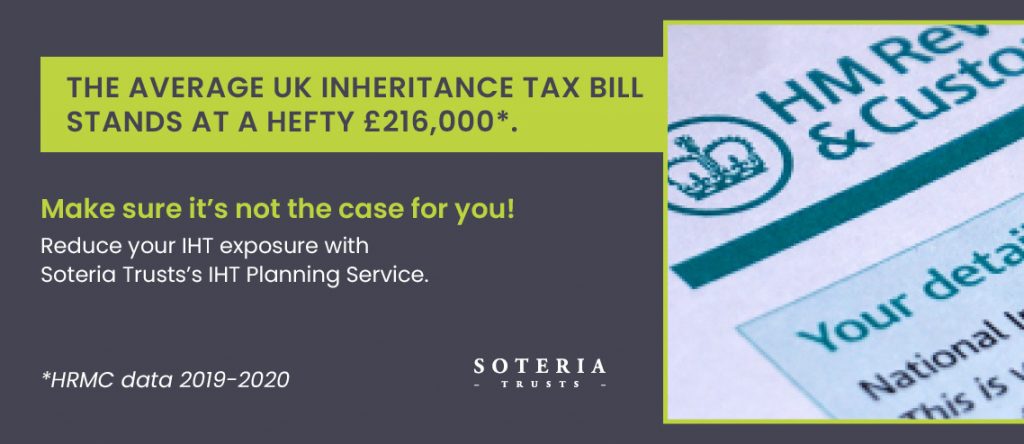The Taxman Cometh: UK Government Collects £2.6bn in Inheritance Tax

Please be advised that the information in this article regarding QNUPS and IHT is no longer accurate due to the recent changes announced in the UK Budget. Starting in April 2025, the regulations will have significant implications that may affect your understanding of these topics. We encourage you to stay informed and consult with a Soteria Trusts expert to navigate these changes effectively.
Today, we consider a topic that is uncomfortable for some and even taboo for others. It’s a topic that we see and hear about every day of our lives and an event that happens to everyone at some point.
Some modern-day philosophers say only three things are ‘guaranteed’ in this life: death, divorce and taxes. The addition of divorce is intended to put a smile on the face of the audience when, in reality, there is nothing funny about it. Divorce has been added after the sharp rise in the number of couples who marry and then a few years later get divorced. There are some countries that report that 30%+ of marriages end in divorce – a staggering number.
Staying married while living and working in the pressure cooker of Hong Kong isn’t easy, yet the divorce rate here is approx. 2.5%, down from a high of over 5% in the late 1970’s. The main reason for the drop is that fewer and fewer people these days put their trust in marriage because they don’t want to be giving away 50% of their existing assets and maintaining former partners if the relationship doesn’t make it. The recent addition to the original two might get a few laughs, but mindsets have changed, and it seems that not getting married in the first place is as good a way as any of not ending up divorced and, therefore, protecting your assets.
Rarely does a strategy of doing nothing work out well, but in the case of divorce, it seems to. Turning our attention to the other two topics of death and taxes, we know that the two are linked closely at death and that a growing number of people are being hit with IHT each year when it could have been easily avoided or mitigated by having an Estate Plan in place.
In the UK, inheritance tax is a reality many families must face when a loved one dies. In the first three months of the 2023 tax year, HMRC collected a staggering £2.6bn in inheritance tax receipts, which is £200 million higher than in the same period a year earlier. 2022/23 saw a record £7.1bn brought in from IHT, but this financial year already looks set to beat that. HMRC has revealed that a further £603 million was raised on inheritance taxes (IHT) in July 2023.
The Office for Budget Responsibility’s latest forecasts suggest IHT will be well above £7.2bn this financial year, and will be as much as £8.4bn by 2027/28. Ignoring your exposure or putting off a well-thought-out tax and legacy plan could be very expensive. So, if you know that IHT is likely to knock on the door of your estate following death, why aren’t you doing something about it? Ignoring or thinking it will go away will only worsen matters for your loved ones following your death. You can avoid divorce by not getting married, but you won’t avoid paying tax on death unless you make a provision. Let us explore more about this topic and what it means for us and our families.

What is Inheritance Tax?
Inheritance Tax (IHT) is a tax on the estate (property, money, and possessions) of someone who has passed away. The tax is calculated based on the value of the estate above a specific tax-free threshold (also known as the nil-rate band). The current IHT threshold is £325,000. However, if your estate’s value exceeds the threshold, the excess amount will be taxed at a rate of 40%. IHT applies to everyone in the UK, regardless of whether the person is a British citizen. It also applies to foreign nationals if they own UK assets at the time they die. However, there are allowances and exemptions that can be utilized to reduce the tax bill.
Related: What exactly forms your taxable estate?
IHT allowances
One such allowance is the nil-rate band (NRB), which sets the first £325,000 of an estate as tax-free. This can also be passed on to a surviving spouse or civil partner, thereby effectively doubling the threshold to £650,000.
Related: How much can you inherit without paying IHT?
If the estate is being passed on to family members, they can claim an additional Residence Nil Rate Band (RNRB). It is available on top of the NRB where the deceased left a residence or the sale proceeds of a residence to his or her direct descendants. The RNRB allowance is £175,000 per person.
Additionally, several types of exempt gifts can be made beforehand to reduce the IHT bill, such as annual gifts of up to £3,000, wedding gifts, and gifts to charity. Planning ahead and considering these allowances and exemptions is essential when doing estate planning.
£29 million per day in IHT receipts
The £2.6 billion in IHT receipts collected in the first quarter of 2023 is staggering, with the UK government collecting an average of £29 million per day. Several reasons for this increase include the rise in property prices, which has resulted in many families being pushed into the IHT bracket. Additionally, the frozen tax allowances do not rise with inflation and push more middle-class families into the IHT net.
Related: All about the IHT Tax Allowance Freeze
It is essential to note that inheritance tax is not just a tax on the super-rich. Middle-class families, especially those with property assets, could also be hit. The average UK home has more than tripled in value over the past two decades, from £84,620 in 2000 to £288,000 today. An estate could easily exceed the threshold with the addition of other assets such as savings, investments, and life insurance policies. It is crucial, therefore, to take steps to limit the amount of IHT paid.
The importance of IHT Planning
One such step is through estate planning, which involves careful consideration of the distribution of assets after death. It is essential to seek expert advice to ensure that the estate is structured in a tax-efficient way. There are several options available, including trusts, which can be used to pass on assets tax-free. Additionally, keeping a record of all gifts and donations made is essential to ensure that they do not affect the tax bill.
Many families face inheritance tax when a loved one dies. With the UK government collecting £2.6bn in the first quarter of 2023, it is more essential than ever to take steps to limit the IHT bill. By planning ahead, families can keep more of their hard-earned wealth within the family and avoid unnecessarily falling into the IHT bracket. Let us learn from this and plan for our future accordingly.
Nothing suggests that the year-on-year increases in IHT receipts will end anytime soon. Families may want to take professional tax-planning advice to ensure they don’t pay more tax than they need to.
The Soteria Trusts IHT Planning Service
Safeguarding your wealth is the goal of the Soteria IHT Planning Service. Let us expertly navigate the planning process and provide you with personalized solutions. Discover our comprehensive checklist to minimize your IHT and secure your financial future effectively.
Make a Will and LPA – A Will and an LPA are the first steps in any estate planning process. Soteria Trust’s Wills start at 6,000 HKD. Learn more about the service here.
Consider your Domicile—If you live in the UK, all your assets, including those from overseas, are subject to inheritance tax (IHT) when you die. This tax is charged at a hefty 40% and applies to amounts that exceed the Nil Rate Bands. Prepare to navigate the financial jungle of death!
Related: HMRC wins IHT case over domicile of choice
Put your assets in a Trust – For centuries, trusts have been a powerful tool to safeguard assets from taxes and probate. Within a trust, cash, investments, pensions, and property are secured under the legal ownership of a trustee. Acting upon your instructions, the trustee can distribute these assets to your beneficiaries whenever you desire. Discover the inner workings of trusts here.
Set up a QNUPS – If your pension meets specific requirements set by HMRC, it will be completely free from inheritance tax when you pass away. Using a QNUP ensures that your pension assets, which include your contributions such as cash, property and other investments, are also exempt from capital gains tax once they are held within the pension.
Gifts during your lifetime – Intriguingly, this tax allowance can diminish the worth of your estate, reducing your Inheritance Tax burden. This allowance permits gifts of £3,000 or less per tax year to be exempt from Inheritance Tax. These gifts can encompass cash, property, and cherished possessions like jewellery or art. Notably, these gifts cease to impact the value of your estate after a period of seven years.
Company Formation (Family Investment Company) – In the ever-evolving world of asset protection, there’s a secret weapon that savvy families use to transfer their wealth and secure their legacy: the Family Investment Company (FIC). This exclusive type of private limited company is carefully crafted by parents or grandparents with a mission to pass on their assets to their beloved children. At the heart of the FIC lies its unique structure, with different types of shares. The wise elders hold the voting shares, maintaining control and making key decisions, while the children are gifted with shares that hold valuable capital assets.
The ever-evolving and intricate rules of IHT can be perplexing. There is no universal fix, as everyone’s situation is unique. To navigate the complexities of efficient Estate and Inheritance Tax Planning, it’s advisable to consult a knowledgeable tax adviser or financial planner. Reach out to us for a complimentary consultation.

